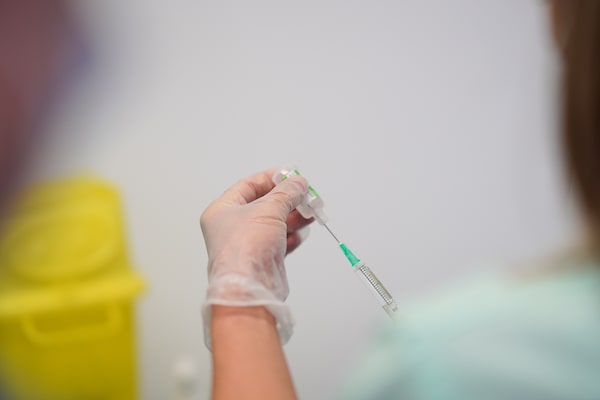
A primary care practitioner prepares a Pfizer-BioNTech COVID-19 vaccine at Haxby and Wiggington Surgery, in York, England, on Dec. 22, 2020.Ian Forsyth/Getty Images
British doctors have said a government decision to delay giving a coronavirus vaccine booster shot to vulnerable patients who have already had a first dose will be distressing and disruptive, their trade union said on Thursday.
The government said on Wednesday it wanted to give a first dose to as many people as possible before starting to administer boosters at 12 weeks, in an effort to provide more people with a degree of protection more quickly.
But Dr Richard Vautrey, chair of the British Medical Association (BMA) committee for local family doctors, said it was “grossly and patently unfair to tens of thousands of our most at-risk patients to now try to reschedule their appointments.”
For the newly approved vaccine developed by Oxford University and made by AstraZeneca being rolled out in Britain next week, the plan is consistent with a finding that waiting 12 weeks maximizes protection against the virus.
But in the case of the Pfizer-BioNTech shot that is already being given, the manufacturer said the shot had not been evaluated on dosing schedules different from the recommended 21 days.
The BMA said scores of doctors had told it that the new approach would distress vulnerable patients and create logistical problems for health care staff.
“The BMA believes these are patients that have already been promised … that they will receive a second dose of Pfizer vaccination next week; they have given their consent to receive it and, quite rightly, are expecting to have it,” the BMA said.
On Thursday, the United Kingdom recorded 55,892 new COVID-19 cases and 964 deaths within 28 days of a positive test for the virus.
More than 944,000 people had been given the Pfizer vaccine by Dec. 27, the health ministry said.
The BMA said it would support any doctors who decided to honour existing booster appointments, and urged the government to provide a “scientifically validated justification” for its new approach.
In a joint statement, the chief medical officers from across the United Kingdom said they recognize that the request to reschedule appointments will be difficult and will distress patients who were looking forward to being fully immunized.
However, “in terms of protecting priority groups, a model where we can vaccinate twice the number of people in the next 2-3 months is obviously much more preferable in public health terms than one where we vaccinate half the number but with only slightly greater protection,” they said.
Sign up for the Coronavirus Update newsletter to read the day’s essential coronavirus news, features and explainers written by Globe reporters and editors.